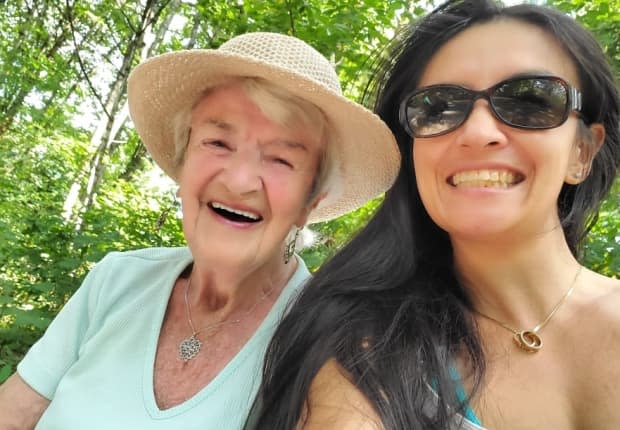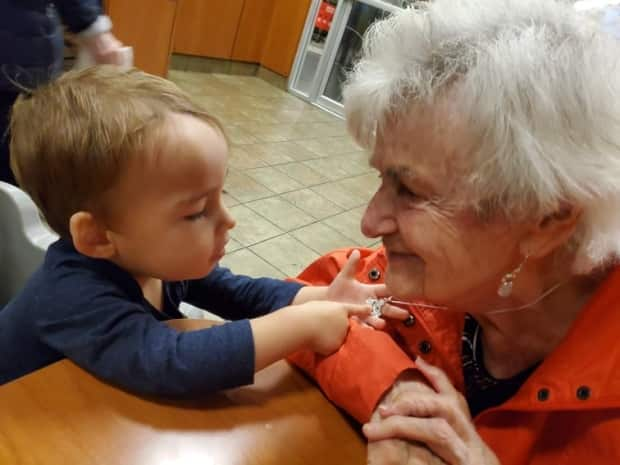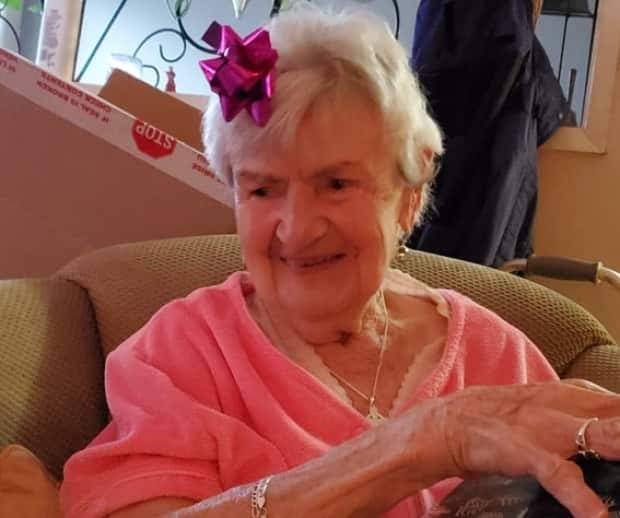She died alone in her apartment during B.C.'s heat wave. Her family says her death was preventable

Kelly Gaba waited for 17 hours while the body of her grandmother, Annie Brown, lay on the floor of her North Vancouver apartment.
Brown, 91, died suddenly in the early hours of June 29, while B.C. endured uncharacteristically high temperatures that broke more than 100 historical records.
The company tasked with removing Brown's body from her apartment was overwhelmed with work that day, much like front-line emergency workers across the province. All told, the extreme heat wave contributed to the deaths of almost 600 people in B.C.
As Gaba sat with her Nana's body, she couldn't help but think her death could — and should — have been prevented, and she wants accountability from the provincial government for what she sees as its lack of preparation ahead of the heat wave.
"It's absolutely frustrating. I feel like it was the most avoidable situation. If [it] had been planned better I know that she would still be here right now," Gaba said.
"She didn't know the dangers she was in."
Mourning a community grandmother
A staple of her North Vancouver community, Annie Brown was known to many as the Nana of Lonsdale, according to Gaba.
"It wasn't just me who saw her as a grandmother. There's people in this building and all down Lonsdale. She's been known for two decades in this community," said Gaba.
Her granddaughter says she couldn't walk one block without stopping to chat with a friend or a stranger. Spontaneous hugs weren't uncommon either.
When her osteoarthritis made it so that she could no longer use the stairs of her three-storey walk-up building, she would sit on her balcony, waving and chatting with those who walked by.
"She is the light of the party. Very social. Very caring," said Gaba, who remembers how Nana Brown would spend her Sundays calling friends and family in her native Ireland and across Canada.

While the coroner's investigation into the cause of Brown's death is still underway, Gaba does not doubt that her Nana could have had many more vibrant years left to live if it weren't for the extreme heat.
She had plans for a trip to Toronto to see her new great-grandchildren, a summer barbecue at Gaba's home in Surrey, and weekly Friday visits to Capilano Mall with Gaba and her infant child and mother, who is Brown's daughter.
"She should still be here with us. She should be able to play with her great-grandsons. We were known at Cap Mall as the four-generation crew," said Gaba.
Emergency workers 'overworked, stressed out, overwhelmed'
On the evening of June 29, Brown's body was discovered on the living room floor of her one-bedroom apartment by her neighbour. She was still wearing her nightie. Her pills were scattered about. A small pink plastic fan sat on a stool, offering little relief from the blistering heat.
Gaba had given Brown's neighbour a key to check on her Nana, which she would do every evening.
When Gaba got the call, she spoke with the paramedics and rushed over to North Vancouver from Surrey. By the time she arrived, a doctor had already pronounced Brown dead. The paramedics were gone, off responding to a long list of emergency calls. A pair of police officers and some neighbours remained.
"They were so busy. Everybody around that situation was overworked, stressed out, overwhelmed," said Gaba, adding that she wasn't able to get a hold of the coroner for two hours.
At times during the heat wave, emergency dispatchers had more than 200 calls waiting for a response. Many paramedics have since blamed the Ministry of Health and B.C. Emergency Health Services for being ill-prepared.
Guilt and accountability
Despite visiting her Nana every three days and preparing her meals, Gaba admits it's difficult not to blame herself at times.
"I carry guilt sometimes. I'm only 40 minutes away. And I felt, 'What if? What if I had known she wasn't able to handle this heat? What if I took her to a hotel? Why didn't I think to check on what the temperature was [in her apartment]?'" Gaba said.
But she believes that guilt should also be shared by government officials.

She feels the Ministry of Health and Emergency Management B.C. failed to adequately warn the public of the severity of the heat wave.
After 18 months of clearly communicating the risks around the global COVID-19 pandemic, Gaba feels her government failed her Nana and the others who died when it came to doing the same about the heat.
CBC has reached out to the B.C. government for comment.
She also finds it hard to come to terms with the notion that something as simple as air conditioning might have saved Brown's life.
As the planet faces the realities of climate change, Gaba says there need to be real discussions about building codes and the requirement for air conditioning in new builds, as well as the addition of air conditioning in existing properties.
"It should be mandatory at this point. We are facing global warming. And the weather, it's got its own nature, but we have some control of some things and that includes how we build and how we prepare for future situations like this," she said.

 Yahoo Finance
Yahoo Finance 